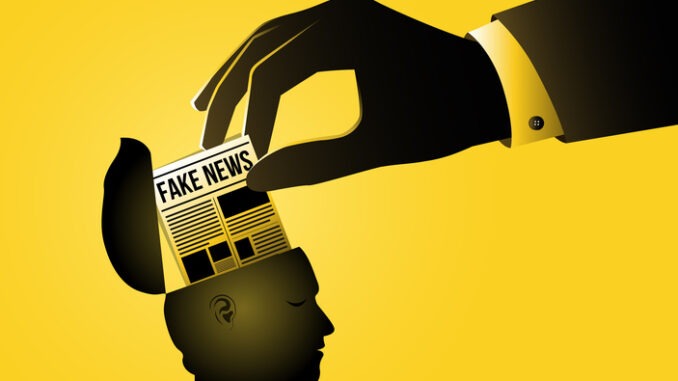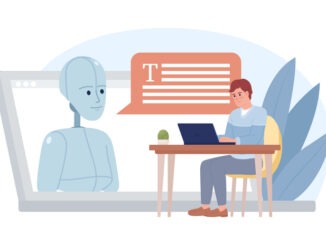
The line between truth and fiction is becoming increasingly blurred, Gary Henderson explains why it’s vital to equip students with the skills to critically navigate the digital landscape
The world is changing at a quickening pace, driven largely by technology. We have seen ChatGPT reach one hundred million users in around two months – this feat took television thirteen years to reach half that amount. Generative AI is likely to be one of the most disruptive technologies yet in its ability to quickly generate and share new content but what does this mean in relation to fake news, news and the truth?
What is Truth?
I think it is important to acknowledge what is meant by truth. There are those things which are simple factual truths such as the fact that when items are dropped, they fall to earth through gravity. This can be easily verified and demonstrated. But much of what we consider as truth is our own personal truth, based on interpreting events and information through the lens of our own cultural backgrounds, values, and biases.
This therefore leads to differing views of what is “true.” I also think, as we learn more about our world, about society, about people, etc, our individual mental model of the world becomes more complex and more nuanced, meaning it becomes more and more difficult to identify common truths.
This is the challenge in these personal truths, as others may seek to manipulate or shape our views through the events and information they present to us. This isn’t a new thing, with Goebbels, the Nazi Minister of Propaganda seeking to shape public perception in Germany during World War II using a range of media to spread Nazi ideology and manipulate “truth.” Fast forward to our internet connected world, where everyone can easily share content, and we all have some power to shape others truth, and the big tech companies and their algorithms have even more power in deciding what posts we see or do not see.
And then we have generative AI. Until recently the medium of content went some way to giving us assurances as to how truthful things were. Text could be easily faked, but images required more effort and audio and video, significantly more effort so we could almost intuitively assign trust based on the medium. Generative AI, and the ability to quickly create images, audio and even video, based on existing content and a couple of simple user prompts throws this into question. The medium no longer provides the assurances as to truth that it once did.
Fake News: Identifying Fact from Fiction
I often wonder about how we identify that piece of fake content from among those which are true. How can we tell if something which has been shared online as truth is in fact false? I think we also need to consider the true content, let’s say a post involving politician or a celebrity in an embarrassing situation, where they then claim it is fake, but in fact it is true. We need to be careful not only of those which claim something to be true, but also possibly equally so of those seeking to tell us something is false. And generative AI means we now need to be more critical of the content which we are presented with, and which we consume, to make judgements as to whether it is likely to be true or not.
As generative AI continues to develop in its capabilities, this will only become more difficult. To further compound the issue around truth and fake news, we live in a world where common truths are becoming more difficult to identify, and where the world itself is becoming faster and busier, such that the time to stop and consider, to contemplate and judge is only lessening.
Equipping Students for a Digital World
Given the challenges we now find in relation to what is true and what is not, it seems clear that schools should equip students with the critical thinking skills necessary to navigate a digital world increasingly influenced by AI. The need for critical thinking, one of the 4 C’s (creativity, communication, critical thinking and collaboration, although there are now more than 4 C’s including character, for example) has long been discussed related to the fact that technology and knowledge is changing and advancing so quickly. I would suggest that AI is just the most recent technology advancement once again highlighting the need develop critical thinking in our students. As generative AI makes it easier to create and disseminate content, it becomes increasingly crucial for students to develop the ability to question, analyse, and evaluate the information they encounter. But this will require time allocated to discussing and exploring this issue, time taken from the already busy curriculum.
Questions for Schools to Consider
The allocation of time to focus on the development of AI skills, including the necessary critical thinking skills will be a challenge which isn’t easily solved however rather than seeking to find a solution, I believe we need to simply seek to move forward iteratively and be better today than we were yesterday. I would therefore propose several questions which schools could consider in relation to preparing students for the digital AI enabled world we now find ourselves in:
- What are the goals/aims of the school and is critical thinking, discovery and/or curiosity part of this?
- Can we signpost in our current curriculum offering where there are opportunities to develop critical thinking and other AI related skills?
- Can we build more opportunities to engage students in critical thinking, including in critically considering online content? This can be in lessons, in assemblies, in extra-curricular opportunities, etc
We cannot slow the pace of technological change, nor can we slow the pace of AI development and AI adoption, which in turn means we are faced with an increasing deluge of content, some true and real, and some fake and untrue. We also cannot trust the social media vendors to monitor the content posted on their sites, with the recent announcement by Meta as to abandoning fact checkers being proof of this.
As such students will need to be able to judge for themselves the validity of the content they consume, they will need to be able to think critically. And who is better placed to support them in developing these skills, but their schools? This is something I believe all schools should be seeking to consider and consider now.


Be the first to comment